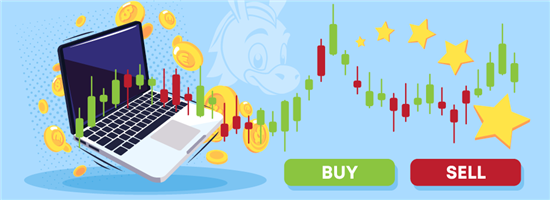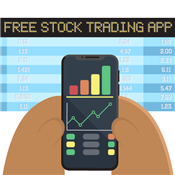Best Stock Buying Apps
The best investment apps let you trade stocks on the go, right from your phone. But which one is the best for you? Read on to find out.
 |
- What are the best stock buying apps?
- Fidelity: Best All-Around App
- Robinhood: Best for Beginners
- Sofi Invest: Best for Financial Advisors
- Charles Schwab: Best for Multiple Platforms
- Webull: Best for Advanced Analysis Tools
- Interactive Brokers: Best for High-Volume Trades
- E*Trade: Best for Active Traders
- M1 Finance: Best for Automated Tools
- Ally Invest: Best for Investing and Banking
- Stash: Best for Stock Rewards
The 10 best apps for buying stocks are:
There are a ton of investment apps you can download on your phone right now. These can help you buy stocks and other investment apps anywhere you want.
But with how many options there are available, where do you even begin?
10 Best Stock Buying Apps
Looking to buy stocks with just a few taps through an investment app? Here are 10 options to help get you started.
| Annual Fee | Stock Trading | Trading Platform | |
|---|---|---|---|
| Fidelity | None | $0 | Desktop, Web Trading, Mobile Apps |
| Robinhood | Starts at $0 | $0 | Web Trading, Mobile Apps |
| SoFi Invest | None | $0 | Web Trading, Mobile Apps |
| Charles Schwab | None | $0 commission on U.S. stocks and ETFs | Desktop, Web Trading, Mobile Apps |
| Webull | Starts at $0 | $0 | Desktop, Web Trading, Mobile Apps |
| Interactive Brokers | None | IBKR Lite: $0 per share (min $0 per order) IBKR Pro - Fixed: $0.0005 per share (min $1.00 per order, max 1.0% of trade value) IBKR Pro - Tiered: Starts at $0.0035 per share for less than 300,000 shares (min $0.35 per order, max 1% of trade value) | Desktop, Web Trading, Mobile Apps |
| E*TRADE | None | $0 per trade | Web Trading, Mobile Apps |
| M1 Finance | A $3 monthly platform fee will apply to clients with less than $10,000 in M1 assets or without an active M1 Personal Loan. | $0 | Web Trading, Mobile Apps |
| Ally Invest | $0 | $0 per trade | Web Trading, Mobile Apps |
| Stash |
| $0 | Web Trading, Mobile Apps |
The best app for buying stocks will depend on your trading style and level of experience. Beginners who prefer a DIY style of trading may like apps like Robinhood, while people who prefer more of a hands-on and research-intensive approach may like Webull. Make sure to look at each investment app and see if its features apply to the way you like to trade.
J.P. Morgan Self-Directed Investing - Get Up to $1,000
- Get up to $1,000 when you open and fund a J.P. Morgan Self-Directed Investing account with qualifying new money.
- $1,000 when you fund with $250,000 or more
- $325 when you fund with $100,000-$249,999
- $150 when you fund with $25,000-$99,999
- $50 when you fund with $5,000-$24,999
- Get unlimited commission-free online stock, ETF, fixed income, and options trades when you open an account.
- $0 Online Commission trades
- Choose an account that's right for you: General Investing, Traditional IRA or Roth IRA.
- Access our secure, easy-to-use trading experience online or through the Chase Mobile® app.
- Our powerful tools and resources are built to help you take control of your investments.
INVESTMENT AND INSURANCE PRODUCTS ARE:
Transfer and Earn Up to $5,000 Bonus
Enroll your new eligible TradeStation account in this offer either by using promo code BDEVAGFG on your new account application or by requesting to enroll, via telephone, with a TradeStation Representative. Within 45 days of account enrollment, fund your account with at least $500. Maintain at least $500 in your account for 270 calendar days. New assets will be aggregated during the 45-calendar day period following the enrollment date to determine the amount of your cash offer.
| New Assets | Cash Bonus |
|---|---|
| $500 - $24,999 | $50 |
| $25,000 – $99,999 | $250 |
| $100,000 – $199,999 | $400 |
| $200,000 – $999,999 | $800 |
| $1,000,000 – 1,999,999 | $3,000 |
| $2,000,000+ | $5,000 |
Fidelity: Best All-Around App
| App Store | 4.8/5 stars (2.2+ million ratings) |
|---|---|
| Google Play Store | 4.4/5 stars (124,000+ ratings) |
Fidelity is a full-service investment firm that allows you to buy stocks via web browser, mobile app, and desktop app. There are also no commissions, trade minimums, and barely any account fees.
Its user interface is also very comprehensive, offering tabs of information for different types of investing. This includes general summaries, your positions, activity, analysis, and more.
Why we like Fidelity:
Fidelity offers advanced research tools for stock evaluation like:
- Quotes on individual stocks, company financial statements, key company statistics, and more
- Key information like a stock's earnings, growth rates, dividend yield, and more
- News and research reports that'll help you keep track of the latest trends
- Stock screeners that let you quickly sort through extensive lists of stocks and pick one based on your criteria
Additionally, Fidelity is practically a one-stop shop with a ton of investment options. If you ever decide to move past trading stocks, you'll have everything you'll ever want on Fidelity.
This includes ETFs, options, cryptocurrency, mutual funds, bonds, fixed income funds, and US Treasuries and CDs. You can even open multiple account types like IRAs, 529 College Savings accounts, and more.
Pros + Cons:
|
|
Robinhood: Best For Beginners
| App Store | 4.2/5 stars (4.2+ million ratings) |
|---|---|
| Google Play Store | 4.1/5 stars (477,000+ ratings) |
Robinhood is perfect for beginners who want a no-frills approach to buying stocks. It lets you choose which stock you want to buy and what type of order you want to execute.
In terms of educational and stock evaluation tools, you'll have real-time market updates, side-by-side stock comparisons, and prices paid by other investors.
Why we like Robinhood:
Fractional shares on Robinhood are some of the cheapest you'll find. You can start with as little as $1, allowing you to try out stock trading even if you don't have a lot of capital. It's also free to use and offers commission-free trades.
The Robinhood app is also very clean and beginner-friendly. This means as soon as you start trading, you won't be bombarded with jargon and charts that may overwhelm you.
Pros + Cons:
|
|
If you've never purchased or traded a stock before, Robinhood is a great place to start. They offer commission-free trades and fractional shares for as low as $1. The app also has a very beginner-friendly user interface that makes navigating through its services as simple as possible.
Sofi Invest: Best For Financial Advisors
| App Store | 3.7/5 stars (2,300+ ratings) |
|---|---|
| Google Play Store | 4.0/5 stars (33,000+ ratings) |
SoFi Invest lets you trade US-listed stocks on the NYSE, NASDAQ, NYSE American, and more. There are no minimum investments, account fees, or trading fees. Plus, fractional shares from $5.
The app lets you place trades, track the performance of your stocks, and give you access to real-time quotes. It even has social features that let you share your portfolio with other people on the app.
Why we like SoFi Invest:
SoFi offers free consultations for anyone—both beginner and experienced traders. Connecting with a financial advisor can help you:
- Reach your financial goals with recommended strategies
- Build your budget by providing good spending habits
- Leverage debt positively by balancing repayment
- Save for the future as well as for emergency funds
- Create investment strategies based on your risk tolerance
With SoFi, you can choose between DIY and robo-investing. If you prefer automated investing, they can create a diversified portfolio for you. From there, all you need to do is deposit money and SoFi will do all the heavy lifting for you.
Pros + Cons
|
|
DIY investing refers to the strategy that most retail or individual investors use to build and manage their own portfolios. It's also known as self-directed investing. If you're building your portfolio from scratch, these free stocks can give you a leg up.
Charles Schwab: Best For Multiple Platforms
| App Store | 4.8/5 stars (814,000+ ratings) |
|---|---|
| Google Play Store | 2.4/5 stars (25,000+ ratings) |
Charles Schwab is one of the oldest names in investing, being established in 1973. With over 50 years of experience, they now have over 34.8 million accounts.[3]
It's a free-to-use, full-service brokerage that lets you trade stocks without any commissions. There are also no trade minimums or hidden fees. Fractional shares are also available for as low as $5.
Why we like Charles Schwab:
Since Charles Schwab recently acquired TD Ameritrade,[4] Charles Schwab users now have access to multiple platforms (including thinkorswim).
Having multiple platforms means anyone—no matter how much trading experience you have—has something to gain from Charles Schwab. This includes:
- Educational resources for those just starting out
- Customizable platforms and tools
- 24/7 customer service
- Highly rated screeners
- Advanced analysis tools
Additionally, if you're planning to expand your investing into ETFs, Charles Schwab has some of the best ETF screeners on the market.
Pros + Cons:
|
|
Webull: Best For Advanced Analysis Tools
| App Store | 4.7/5 stars (292,000+ ratings) |
|---|---|
| Google Play Store | 4.3/5 stars (186,000+ ratings) |
Although it's a relative newcomer in the space of investing apps (est. 2017), Webull has made a name for itself due to its charting and analysis tools.
It's also free to use and lets you trade commission-free with fractional shares as low as $5. On top of that, it also has no account minimums and barely any account fees.
The app also offers many features that appeal to active and experienced traders. It supports short selling, margin trading at up to 4x buying power, and up to 3 day trades.
Why we like Webull:
Webull offers some of the most advanced charting and technical analysis tools on the market. This makes it perfect for those who like to dive deep into research and make their own investment decisions. This includes:
- Real-time market quotes
- Price alerts for stocks on your watchlist
- Stock screeners
- Market data from 5 categories and 100+ exchanges
- 50 technical indicators
- Analyst ratings
- Video replay for historical stock price action
Webull also offers a free paper trading account. This is a practice trading account that gives you unlimited virtual money and real-time market data to simulate trades.
Pros + Cons:
|
|
Fund and Get 4% Match Bonus
Enroll in this offer, and transfer or deposit $100,000 or more to your Webull account. Maintain a total net qualifying funding amount of $100,000 or more until the payment date of the final installment of the match bonus. The match bonus will be paid in 6 installments. The first installment will be issued on or about May 15, 2026.
Interactive Brokers: Best For High-Volume Trades
| App Store | 4.4/5 stars (7,000+ ratings) |
|---|---|
| Google Play Store | 4.7/5 stars (28,000+ ratings) |
Interactive Brokers (IBKR) is a full-service app that has over 2.6 million users and over $424 billion in assets managed (including 2.2 million trades per day).[6]
It has no annual, account, transfer, or closing fees. There are also no account minimums or inactivity fees.
Why we like Interactive Brokers:
IBKR offers two account tiers: IBKR Lite and IBKR Pro. You can choose the plan that will minimize your cost of trading the most.
If you're a regular retail investor, you can enjoy commission-free trades with IBKR Lite. But if you're a very high volume trader, their fixed/tiered pricing with IBKR Pro could earn you discounts on your purchases.
IBKR Pro users also get access to their SmartRouting feature. This helps you look for the best available prices for stocks across exchanges and dynamically re-routes your order to execute at the best price.[7]
Pros + Cons:
|
|
E*Trade: Best For Active Traders
| App Store | 4.6/5 stars (140,000+ ratings) |
|---|---|
| Google Play Store | 3.9/5 stars (41,000+ ratings) |
| App Store (Power E*TRADE) | 4.5/5 stars (8,300+ ratings) |
| Google Play Store (Power E*TRADE) | 3.8/5 stars (1,500+ ratings) |
E*TRADE offers two separate apps for investors with different experience levels. Both apps are free to use, have no account minimums, and offer commission-free trading on stocks, ETFs, and options.
Why we like E*TRADE:
For beginners, they offer the standard E*TRADE app with features like:
- Investment options like stocks, mutual funds, and options (with 2-, 3-, and 4-legged spreads)
- Market news and third-party research from Bloomberg TV
For more advanced investors, they offer the Power E*TRADE app. You get a more powerful app and more tools at no extra cost.
You can quickly trade stocks, ETFs, simple and complex options, and futures on a single ticket. And execute strategies using customizable options chains (including custom and four-legged spreads).
Plus, you get advanced tools like:
- Technical Pattern Recognition
- Earnings Move Analyzer
- Risk/reward probabilities analysis
- Custom & preset scans
- 145+ chart studies and drawing tools
- More info on market movement with streaming quotes, news, earnings, dividends, depth view, gains, and more
All these give you extra metrics, patterns, price movements, and analytics to help with your trade decisions.
Pros + Cons:
|
|
Active trading refers to the buying and selling of stocks or other assets for quick profit. These trades are done in the hope of profiting from short-term price fluctuations.
M1 Finance: Best For Automated Tools
| App Store | 4.7/5 stars (59,000+ ratings) |
|---|---|
| Google Play Store | 4.5/5 stars (24,000+ ratings) |
M1 Finance offers a perfect in-between of DIY investing and automated management.
It offers over 6,000 stocks with commission-free trades and fractional shares for as low as $1. And although they do have an account minimum, it's only $100 ($500 for retirement accounts).[9]
Why we like M1 Finance:
On M1 Finance, you can design a portfolio yourself, called "Pies" with each "slice" representing a stock or ETF. You pick the percentage of each asset that will make up your Pie (for example, you could pick 100 different stocks making up 1% each).
As you add more money into the account, M1 Finance will automatically buy for you based on the percentages you set.
It will also automatically rebalance your portfolio to keep it as close as possible to your original targets. This maintains the risk-return profile you initially designed.
If you don't know which specific stocks to invest in, you can choose one of their ready-made Model Portfolios. Each will vary depending on risk tolerance, so be sure to choose one that aligns with your investment goals.
Pros + Cons:
|
|
Ally Invest: Best For Investing and Banking
| App Store | 4.7/5 stars (73,000+ ratings) |
|---|---|
| Google Play Store | 2.7/5 stars (27,000+ ratings) |
Ally Invest is free to use and requires no minimum deposit. It also lets you trade stocks without having to worry about paying for commissions.
They even have a robo-advisor called Ally Invest Robo Portfolios, which offers fee-free rebalancing, a low minimum of $100, and 24/7 support.
Why we like Ally Invest:
Ally Invest integrates easily with other Ally products. If you're already an Ally Bank account holder, this allows you to get an all-in-one snapshot of your overall financial condition.
This means you can transfer money between your investment and savings account daily.
On top of that, Ally also gives you the opportunity to earn interest on your cash balance. Most brokers offer no or low interest rates, so Ally's comparatively high interest rates are a nice little addition to their beginner-friendly investing app.
Pros + Cons:
|
|
Stash: Best For Stock Rewards
| App Store | 4.7/5 stars (297,000+ ratings) |
|---|---|
| Google Play Store | 3.8/5 stars (103,000+ ratings) |
Stash is an app designed for beginners in mind. You can learn, save, and invest from one app. Additionally, as soon as you fill out a questionnaire about your goals, risk tolerance, and interests, the app gives you investment recommendations.
It offers stocks, ETFs, and cryptocurrency—all commission-free. However, you'll need to subscribe to one of their plans:[10]
- STASH Growth ($3/mo)
- STASH+ ($12/mo)
The Growth plan includes basic advice for beginner investors, a managed account, retirement account, and banking access. While the Stash+ plan also includes advice for family finances and kids' portfolios.
Why we like Stash:
Stash offers a Stock-Back Card that allows you to gradually invest with purchases you make with your debit card. By making qualifying purchases, you can earn up to 1% stock back every time you spend.[11]
The cost of the card is already included in what you pay for their monthly subscription. It's a great way to "invest without thinking" with your purchases.
Pros + Cons:
|
|
Tax-loss harvesting is a tool that helps you reduce your taxes on capital gains. It involves selling an asset or security at a net loss to offset an increase in price of another asset or security. This eliminates the capital gains tax liability of the latter.
What To Look For In Stock Buying Apps
Each app will cater to a different type of trader. Make sure to consider these points before choosing a stock buying app:
- Fees
Make sure to take all the fees and charges into consideration when choosing an app to trade stocks on. Not everything on the list is free to use. For example, Stash has a subscription plan you'll need to pay monthly if you want to trade.For beginners looking for a cost-effective trading experience, take a look at our detailed guide on free stock trading apps. - Educational content
Just starting out? Make sure that the investment app you choose has an extensive library that will not only teach you how the platform works, but also investing basics. - Stock evaluation tools
For those who like to do their own research to make their investments, stock evaluation tools are essential. Whether it's charting tools, screeners, or real-time market updates, make sure that the app is providing enough information for you to make your decisions. - Automated investment tools
If you like to be more hands-off with your investments, robo-advisors can be crucial for you. Be sure to pick an app with a good robo-advisor that can help you make trades and manage your portfolio.
Many stock trading apps offer commission-free trading and have no minimum investments. Some will even have fractional shares that will let you get started with just a few dollars. All you need to do is open an account, deposit money, and pick stocks to invest in.
Methodology
To come up with the list, we looked at several factors.
The first is the fees. No one wants fees eating into their returns, so we put free-to-use and commission-free trading apps at the top. Then we looked at the other miscellaneous fees charged, such as inactivity and subscription fees.
Next, we looked at the features that made each investing app unique. Some offer advanced research tools while others have more unique features like stock rewards or multiple platforms. To appeal to a wide range of investors, we made sure to include a wide array of options.
Lastly, we looked at the level of experience required for each app. Some apps go for a "one-stop shop" approach. And though this may be helpful for more experienced investors, all the charts and jargon could scare away people who are just starting out. We made sure to include options for both.
BOTTOM LINE
It seems like there are dozens, if not hundreds, of investment apps to choose from. It can feel very overwhelming.
Think about what type of trader you are and what type of features will work for you. If you're a new investor, a simple app like Robinhood or Stash will make it easy to get started. But if you're more experienced, you may want an app with better research tools like Webull or IBKR.
Be sure to look at each app, see what they have to offer, and how they can suit you and your investment style.
References
- ^ Fidelity. How to Add Active Trader Pro, Retrieved 02/10/2024
- ^ CNET. Robinhood backlash: What you should know about the GameStop stock controversy, Retrieved 11/10/2023
- ^ Charles Schwab. Charles R. Schwab, Retrieved 02/10/2024
- ^ Charles Schwab. The Charles Schwab Corporation to Acquire TD Ameritrade, Retrieved 11/10/2023
- ^ Charles Schwab. Schwab margin rates and requirements., Retrieved 11/10/2023
- ^ Interactive Brokers. IBKR Fact Sheet, Retrieved 02/10/2024
- ^ Interactive Brokers. Dedicated to Best Price Execution, Retrieved 11/10/2023
- ^ CNBC. Morgan Stanley to buy E-Trade for $13 billion in latest deal for online brokerage industry, Retrieved 11/10/2023
- ^ M1 Finance. My first deposit, Retrieved 02/10/2024
- ^ Stash. Pricing, Retrieved 02/10/2024
- ^ Stash. Shop like an investor, Retrieved 11/10/2023
Write to Iggi Vargas at feedback@creditdonkey.com. Follow us on Twitter and Facebook for our latest posts.
Note: This website is made possible through financial relationships with some of the products and services mentioned on this site. We may receive compensation if you shop through links in our content. You do not have to use our links, but you help support CreditDonkey if you do.
|
|
|







